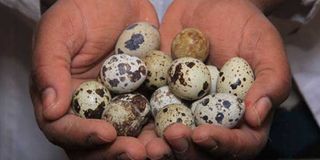To understand climate change, follow the story of Kenya and the quail eggs

A farmer displays quail eggs in Nyeri on January 18, 2014. To understand climate change, follow the story of Kenya and the quail eggs. PHOTO | JOSEPH KANYI | NATION MEDIA GROUP
What you need to know:
- A UN news agency recently published a story of Togo's old capital city Aneho saying it will disappear from the map by 2038.
- The fishing economy has collapsed in Aneho and fishermen need larger boats to sail further ashore.
- The people cannot afford larger boats so they harvest sand which further speeds up sea encroachment.
The world’s rulers, rich do-gooders, and also stripes of environmental activists have been meeting in Paris to talk about the world climate, which is wreaking havoc.
Climate change plays out in interesting ways that we often do not realise.
In Kenya, for example, the big thing recently was quail eggs. They are, at least according to what science says, near-magical, much healthier than those laid by the good old hens.
Everyone rushed in to make a killing, and with the market oversupplied, prices collapsed and many people ended with quail egg on their faces and broken hearts.
But how did we find out about quail eggs in the first place? Good information about that is hard to find, but it seems it is ultimately an environmental — or even climate change — story.
As natural habitats for wild animals get more threatened by human activity and criminal (poachers), increasingly some of them have a higher chance of survival in private homes than out there.
HUNTING FOR GUINEA FOWLS
When I was little, during school holidays we would sometimes go to visit with the grandparents.
An uncle, a town man, liked to come to the village on the weekend to hunt. His favourite was guinea fowl.
The highlight of our holidays was going to hunt with him (he had a legal licence for it), as we carried his guns, bullets, and led the dogs.
I am a bleeding heart these days and therefore a little ashamed of that past, but even if I was still inclined, there are no more guinea fowls in the wild in eastern Uganda.
The forests are long gone. You would think that the guinea fowl too is, therefore, extinct in those parts. It is not.
There are probably more guinea fowls, but they are now domesticated. One suspects that these environmentally driven pressure is how Kenyans first developed close encounters with quail.
ENVIRONMENTAL CHANGE
Environmental change, then, is what brought guinea fowl and quail competition to the chicken after it, together with ducks and turkeys, had ruled the domestic market for birds unchallenged for centuries.
Now, once you have guinea fowl and quail domesticated, it is only a step away before you commercialise their eggs.
If the eggs have nutritional merit, good. If not, you create a myth around them.
Our attitudes towards quail eggs, nevertheless, constitute a major behavioural change. And it is only one of the many social shifts that changes in our environment are forcing upon us.
THE ANEHO STORY
A few days ago the UN news agency, IRIN, published a story about Togo’s old capital city, Aneho.
The report said that it was likely to disappear from the map by 2038 if nothing is done to reverse the erosion that is currently eating away between six and 10 metres of coastal land each year.
The report spoke of a prominent citizen of Aneho who had been away for years and recently returned to his village a few kilometres outside the city. The house he had grown in was not there. It had long been swallowed by the sea.
He said that back in the 1990s the sea was still many kilometres away from homes and businesses.
CLIMATE CHANGE IDPS
People have abandoned their homes and some have been become climate change IDPs.
“We used to get there by car or bike,” he told IRIN. “Today, the sea rubs up against us, it enters our homes.”
The fishing economy has collapsed. The fishermen used to be able to throw out their nets from the shore, or just offshore in wooden boats, and bring in fish.
Today, they need larger boats to sail farther offshore to fish. But they cannot afford the boats. So they harvest sand instead.
The problem is that sand harvesting has only speeded up the encroachment of the sea! Togo is not alone in Africa. Its attitude, though, is pathetic.
Togolese authorities were quoted as saying that they were “closely monitoring” the evolution of the sea and water levels — presumably the same way they have been doing without taking any action for decades. For the people of the area, it is already too late.
“The waters are rising, our fish are gone, our homes destroyed,” one of them said. “It is no longer possible these days to survive here.”
More than anything else, it is that defeat of the spirit to fight back that we most need to find to roll back climate change.
The author is editor of Mail & Guardian Africa (mgafrica.com).





